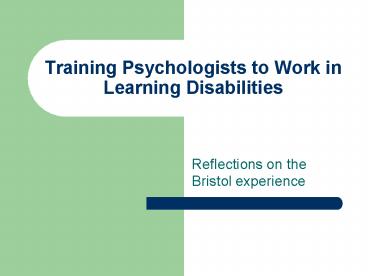Training Psychologists to Work in Learning Disabilities - PowerPoint PPT Presentation
1 / 10
Title:
Training Psychologists to Work in Learning Disabilities
Description:
Previous experience: psychology graduates, assistant psychologists, range ... Exposure to range of therapeutic models: Systemic, CBT, Psychodynamic, Humanistic ... – PowerPoint PPT presentation
Number of Views:87
Avg rating:3.0/5.0
Title: Training Psychologists to Work in Learning Disabilities
1
Training Psychologists to Work in Learning
Disabilities
- Reflections on the Bristol experience
2
Background
- 3 courses in South West SHA
- Bristol programme evolved from the Plymouth
course - Covers AGW area
- Currently based at UoB
- 3 year doctoral programme
- Previous experience psychology graduates,
assistant psychologists, range of backgrounds
3
Philosophy
- Reflective-scientist-practitioner model
- Personal, academic clinical development
- Adult learner model
- Exposure to range of therapeutic models
- Systemic, CBT, Psychodynamic, Humanistic
- (person-centred)
- Constructively critical approach
- Themes Inequalities (class, ethnicity, gender,
disability), Spirituality - Client and carer involvement
4
Course Content
- Academic teaching (3 month block extended
teaching days combined with AMH) - 5 month clinical placements
- Course work (case studies, service evaluation,
psychotherapy process study) - Research thesis, literature review
5
LD Teaching Content (1)
- Aetiology prevalence
- Key issues Empowerment person-centredness,
constructional approaches - History of LD service provision
institutionalisation, normalisation. - Policy Valuing People (Now) MCA MHA.
- Ethical issues e.g. choice capacity best
interests duty of care human rights
6
Teaching Content (2)
- Adaptations to all therapeutic models
- e.g. CBT simplified language greater use
- of pictures short pictorial rating scales
briefer - sessions, diagrammatic formulations, memory
- aids, etc
- Specific topics e.g. PCP, parents with LD,
sexuality, risk assessment, abuse, medication,
accessible information, group work
7
Placements (1)
- With supervisor in clinical setting
- Set goals in Competence Areas Relationships
Assessment Formulation Communication, Training
Consultation Management Organisation
Professional Practice Supervision Personal
Development - Typically caseload of 6 cases (assessment
intervention)
8
Placements (2)
- Issues for Trainees
- Often new to LD personally challenging
impoverished controlled lives shocking
attitudes of carers and other professionals. - Misconceptions its all behavioural, dont
offer individual therapy - Forced to work more creatively (AMH therapy model
limited) more work with systems through
others working in teams. - Communication issues paramount.
- Many pleasantly surprised!
9
Conclusions
- Working in LD can be very challenging for new
clinicians - Model of intensive teaching specific LD
placement seems to work (good feedback) - Majority of learning takes place in service
settings, in MDTs - High commitment to clinical supervision
reflective practice enables personal
professional development
10
The Future ???
- Uncertainty re future intakes in Bristol
- Commitment from SHA services and course team to
continue to provide high quality training. - Challenges Greater multi-professional training,
whilst retaining distinctive features of
psychology greater service user carer
involvement preparation for work in a changing
NHS e.g. FTs, New Ways of Working, etc































